- Home
- Stephanie Laurens
The Pursuits of Lord Kit Cavanaugh Page 9
The Pursuits of Lord Kit Cavanaugh Read online
Page 9
A sharp rap on the front door had him pausing. “Hello,” he said, as the door opened to reveal a somewhat rotund gentleman. “Who’s this?”
The gentleman paused on the threshold. He carried a cane and wore a short top hat, and his striped waistcoat strained to remain decently anchored over his stomach. After several seconds of surveying the scene—Cross had stopped reading and, along with the boys, was silently staring at the stranger—the gentleman harrumphed and, in a manner that screamed self-importance, walked in.
Sylvia moved to intercept him. “Can I help you, sir?”
The gentleman’s gaze, which had fixed on Jellicoe, shifted to her. A slight frown drew the man’s brows down. “And you are?”
Sylvia did not like his tone, but kept an assured smile on her face. “Miss Buckleberry. I’m the school’s administrator.”
“Are you, indeed?” The man looked faintly surprised, then his earlier, somewhat peevish expression returned. “In that case, Miss Buckleberry, it is, indeed, you to whom I wish to address my most strident protest over this school being moved into this area.”
Planting his cane between the toes of his boots and leaning on it, the gentleman glowered—at Sylvia, then at all those behind her, the boys especially. Sylvia could almost see the horrid man’s lip curl.
She drew herself up. “And you are, sir?” Her tone had turned decidedly frosty.
“I, Miss Buckleberry, am Councilor Peabody.” The man returned his gaze to her face and, as if the words gave him license to crush all there, triumphantly added, “Councilor for this ward.” He rolled on, “And I am here to tell you that siting a school such as this in this neighborhood is entirely unacceptable. My constituents don’t want dockside brats running amok around their houses. All well and good to bring education to the poor, but institutions such as this should remain in their proper place—in this case, by the docks.”
Sylvia had encountered men like Peabody before. With icy calm, she met his gaze and arched her brows. “Indeed? Tell me, does the Abbey fall within your ward?”
Peabody nodded with smug satisfaction. “It does, indeed. The Abbey and all the surrounding streets.”
“In that case, sir, I’m surprised you haven’t realized that this hall belongs to the Abbey. The school couldn’t be here had the Abbey not agreed to lease us the hall.”
Peabody blinked. After a silent second, he blustered, “Clearly, the prior had no notion of what manner of school he was accommodating.” Peabody’s gaze returned accusingly to Sylvia. “You may be sure that I will bring the matter to his attention immediately, and then you and this school will be out on your collective ear.”
Sylvia walked forward, forcing Peabody to turn to keep her in sight—to turn toward the door. “If you wish, sir, by all means, do speak with Prior Robert, but I assure you he knows precisely what manner of school this is. He even went so far as to offer the services of the Abbey infirmarian, should we ever require medical assistance.” She continued walking slowly toward the door, drawing the obnoxious Peabody with her. “I have to say that I myself would be reluctant to suggest that Prior Robert had leased us the building without convincing himself of our bona fides.”
That gave Peabody pause. His expression grew faintly concerned. “I... Ah, yes. I take your point.” But then he rallied and straightened. “Be that as it may, secularly speaking, having a school such as this bringing dockside brats into this neighborhood cannot be borne. The residents won’t stand for it—and I certainly won’t.”
He’d worked himself into a lather of righteous indignation again. Sylvia hesitated for only a second before saying, “As to that, sir, we will have to disagree, but before you think to mount any major push against the school, you might like to know that the school exists under the auspices of the Dean of Christ Church and has the financial backing of Lord Christopher Cavanaugh, who has recently taken up residence in the city. As a member of the nobility, Lord Cavanaugh follows the lead given by Prince Albert and our Queen regarding the education of those less fortunate in order to ensure the prosperity of the nation as a whole.”
Peabody had been trailing beside her toward the door. Now, he halted on the threshold, his eyes widening. “Lord Cavanaugh?”
“Yes.” Sylvia saw no reason not to gild the school’s lily. “His brother is the Marquess of Raventhorne. I understand the marquess and his wife are known to Prince Albert and the Queen, and one of the marquess’s other brothers is also associated with the Prince via their shared interest in inventions. Lord Christopher Cavanaugh’s interest lies in building yachts, and he’s in the throes of establishing a new workshop on the docks—indeed, his workshop has taken over the school’s previous premises off the Grove, and through that, Lord Cavanaugh elected to become the school’s sponsor.”
Peabody grunted. After a moment, he scowled and harrumphed. “Regardless of what his lordship thinks he’s doing, I’m sure that, once I see him and recast the matter in its true light, he’ll agree that this school should not be here.” He flung a disparaging glance back at the boys, still sitting on the floor, silent and listening. Then he narrowed his eyes at Sylvia. “Off the Grove, you said?”
Eager to have him gone, she nodded. “The third warehouse from the corner of Princes Street. He’ll either be there or at his office in that new building on King Street.”
“Good. I will hunt him down and speak with him directly. We’ll soon see this settled.” Peabody faced forward and stepped onto the porch. “Mark my words, Miss Buckleberry”—he emphasized his declaration with a jab of his cane—“you will have to move your school from this neighborhood. It doesn’t belong here.”
With that parting shot, Peabody descended the steps, then, affecting his self-important swagger, strode toward the river and the docks beyond.
Sylvia was about to turn inside—to do what she could to repair the damage Peabody’s words had doubtless wrought—when she noticed the severe-looking lady in black standing once more at her gate. As before, the lady was staring—it seemed malevolently—at the school, then she turned and, leaning heavily on her cane, stumped along the short path and up the steps to her front door and disappeared inside.
Inwardly shaking her head, Sylvia turned back into the hall to hear Jellicoe telling the boys, “You heard Miss Buckleberry tell the councilor where to find his lordship. After he spent all day yesterday helping us move here, what do you think his lordship is going to say to a suggestion the school ought to move somewhere else?”
The boys all grinned, and one called out, “His lordship will laugh and say no.”
“Exactly.” Cross had shut the book from which he’d been reading. He waved the boys up from the floor. “And now it’s time we did right by his lordship and got back to our lessons.”
The boys rose with alacrity and returned to their desks.
Sylvia watched Cross and Jellicoe, and even more the boys, settle back into their lessons with no hint of lingering anxiety; evidently, they all had unshakeable faith that Lord Cavanaugh would see off any threat from Peabody and his ilk.
She, too, had instinctively—without a single thought—assumed Kit would do just that and every bit as effectively as the boys might imagine. Not the slightest whisper of doubt over his support had risen in her mind; her trust had been instant and absolute.
Evidently, her recent experience of him had overwritten her previous assumptions and the distrust those had generated.
Like the boys and the teachers, her confidence in him and his support was rock-solid; she would own herself flabbergasted if Peabody made the slightest headway against Kit Cavanaugh.
Crossing to Miss Meggs, who was working on drawing up next week’s timetable, Sylvia said, “I’ll be on my way. I won’t forget the chalk and ink, and I’ll see you all on Monday.” She caught Jellicoe’s and Cross’s eyes and nodded a farewell, then raised her voice and called, “Goodbye, boys. Enjoy your days
off, and I’ll see you all here on Monday.”
“Yes, Miss Buckleberry!” they enthusiastically chorused.
With that happy sound ringing in her ears, Sylvia went out of the door, tugged it closed, and headed for her office.
* * *
After a break for lunch, Kit, along with Wayland, Mulligan, and the other four carpenters, started constructing Wayland’s pulley gantry. They’d already trimmed the beams and struts to the correct sizes. Using ropes and smaller pulleys, they hauled one end of the first of the heavier beams up, then with four men anchoring the ropes, keeping the huge beam upright, Kit and Mulligan heaved and swore and shoved the base of the beam into place. The instant they had it correctly positioned, Wayland set a ladder against it and, with Kit and Mulligan steadying the beam, climbed up and quickly attached iron braces, locking the beam in place against one of the massive timber ribs of the old warehouse.
Wayland came down the ladder, moved it away, attached another set of braces at knee height, then stepped back and motioned for the men to release the ropes, which they slowly did.
Catching their breath, they all stared at the beam, standing straight and solid.
Wayland smiled widely. “Excellent!”
Mulligan and the carpenters grinned, as did Kit.
Wayland swung to face them. “As soon as you’re ready, we can start on the second one.”
The men mock-groaned, but they were soon wrestling the second beam into place, equally successfully.
There were six beams to be positioned, spaced in pairs down the workshop, three beams on each longer side. They’d got all six up and were discussing the logistics of hauling up and securing the crossbeams when a tap on the frame of the open doors drew their attention.
A small, round woman with gray hair pulled back in a tight bun stood peering into the workshop’s gloom. “Lord Cavanaugh?”
Kit grabbed his coat and shrugged into it as Mulligan and the carpenters turned to stare at him. “Lord?” Mulligan asked.
Kit flashed them a grin. “For my sins.” Settling his coat sleeves, he crossed to the woman. “Miss Petty—come in.”
The previous afternoon, when he’d returned to his office after seeing Sylvia home, he’d found Miss Petty waiting. She’d been sent around by the labor exchange. He’d let her into the office and, after a quick discussion of her past experience—with a recently defunct ship-building firm—and the duties he would like her to fulfill, he’d hired her and considered himself blessed.
This morning, despite his early start, she’d been into the office before him; he’d left her organizing and ordering supplies and had told her to call at the workshop in the early afternoon to meet Mulligan and the senior carpenters and to see where she would be spending some of her hours each week.
She advanced, not tentatively but rather with a certain curiosity, her eyes sharp behind a pair of brass-rimmed spectacles as she looked up, taking in what they were working on. “A gantry, is it?”
“Indeed.” Kit paused to glance back at the work in progress and noticed the struck look on Mulligan’s and the other men’s faces. Knowing Miss Petty’s background, her comment hadn’t struck Kit as odd, but meeting a woman with a lick of ship-building understanding had clearly surprised the others.
Grinning, Kit waved the men forward. “This is the company’s new secretary, Miss Petty.” Wayland smiled and came up, keen to make Miss Petty’s acquaintance; the others followed, somewhat more bashfully, in his wake.
Kit made the introductions, then announced, “Miss Petty will be spending roughly half her time here.” Kit gestured at the rough framework for the offices they’d already set in place. “She’ll be sharing the front office with Mulligan. Miss Petty will be responsible for disbursing wages and paying any bills that get presented here, rather than to our office in King Street.”
Miss Petty acknowledged Mulligan’s and the others’ bobbed heads with a serene smile and gentle nods, then said, “It will be a pleasure to work with a ship-building concern again. I was born in the city, and my father was a shipwright.” She paused, then went on, “I should perhaps add that while I will not tolerate any disrespectful language being directed toward me, I am extremely good at not hearing things that are none of my business.” She ended with a cheery smile that, together with her words, got the men relaxing again, and their chorus of “Pleased to meet you, miss” rang sincere.
“If you don’t mind, your lordship, I’ll just take some measurements in the office.” Miss Petty gestured to the area in question. “Perhaps, Mr. Mulligan, you might show me what you have planned for the space, and once I have the measurements, I’ll order whatever’s necessary.”
Mulligan looked strangely uncertain, but nodded. “Aye. We could do that.”
He and Miss Petty moved toward the office.
With Wayland and the others, Kit started walking back to where the gantry struts lay spread on the floor.
A tentative rap on the warehouse door frame had Kit and Wayland glancing that way, then pausing.
A thin boy of about thirteen or fourteen stood in the open doorway, nervously shifting his weight from foot to foot. He cleared his throat and said, “Sir, can you tell me who to see about a job?”
The boy’s piping tenor carried easily through the empty building. Mulligan and Miss Petty halted and turned to study the lad. The other men halted, too, and looked curiously his way.
The lad was tow-headed, and his clothes had seen better days, but he’d clearly made an effort to appear neat and as presentable as he could. Under the combined scrutiny, he stood with his chin up, but Kit noticed he was mangling a threadbare cap between his hands.
That hint of vulnerability made Kit walk across with an easy gait. “I’m one of the owners.” His first impulse had been to tell the boy he should head to the school, but as he got closer, he glimpsed desperation and a hint of despair in the lad’s face. “What sort of work were you looking for?”
The lad swallowed and, after a second, found his voice. “Anything, really. I can fetch and carry, and run messages and such.” His gaze went past Kit to the racks of new tools now standing against the rear wall. The boy’s eyes lit. “And I’m a dab hand at keeping tools in good nick. My da was a carpenter.” The last was said with aching pride.
Kit didn’t miss the past tense the boy had used.
Kit felt a tug on his sleeve and turned his head to find Mulligan beside him.
Raising his gaze from the boy, Mulligan jerked his head to the side. “If I could have a word, your lordship?”
Kit turned back to the boy to see his eyes flare wide—that lordship thing again. Kit nodded to the lad and said, “Wait here.” With that, Kit followed Mulligan deeper into the warehouse. Kit felt fairly confident that while there was an outside chance of a job, the boy would remain, and Kit was reasonably certain there would be a story behind the boy’s request and Mulligan was about to tell him of it.
Sure enough, Mulligan halted and, facing away from the door, caught Kit’s eyes as Kit stopped beside him. “His name is Jack Deaver—Jack the Lad, we all call him. His father was a master carpenter, but he died a year or so ago in a fall from a ship in dry dock. Since then, Jack’s been the only breadwinner in the family—he’s the eldest of five, and his mother is near witless trying to make ends meet. Jack gets what work he can, but he and his mother both are too proud to take charity.” Mulligan paused, then went on, “I heard that you’d funded the school that used to be here to move to a better hall. I’m guessing that means you’re all for young’uns like Jack learning his letters and such. But if you turn him away, he won’t be going to that school—he can’t. He has to do what he can to earn coin...and I’m thinking”—Mulligan looked intently at Kit—“that there’s more than one sort of learning.”
Mulligan nodded at the other men—all four of whom had ambled closer, watching and waiting. “Jack does hav
e a feeling for working with wood—got that from his da, no doubt. Me and the others would be happy to take Jack under our wing. If he turns out to be even half the carpenter his old man was, he’ll soon be worth his weight to us.”
Kit tipped his head, his gaze holding Mulligan’s as Kit narrowed his eyes in thought. Then he glanced at the other men and beckoned them nearer. Once they were close enough to hear, Kit quietly asked, “What about an apprenticeship? A formal one? Jack the Lad working under you, Mulligan, and you others, to learn the trade.”
Mulligan blinked. Then he nodded, and the other men did, too. “That’d do nicely,” Mulligan said. “He’ll work hard for that—he’s a good lad, and you won’t find any man more determined and loyal.”
Kit grinned and clapped Mulligan on the shoulder. “Right, then—let’s tell him the good news.”
On the way to the door, Kit paused beside Wayland to mention the notion of them taking on their first apprentice. Wayland had no objections; Kit hadn’t imagined he would. Joining Mulligan at the door, Kit looked at Jack, who had, as instructed, remained precisely on the same spot.
Kit couldn’t help smiling as he said, “You’re in luck. Mulligan and the others need an apprentice to train under them. You’re the first to come and ask, and the men have said they’re willing to give you a chance.”
Jack’s eyes grew round. He glanced at Mulligan, then looked back at Kit. “But I’ll get paid?”
“Aye, lad.” Mulligan lightly cuffed Jack, then looked at Kit. “The same rates as any apprentice—right, my lord?”
Kit nodded. “Exactly.” He waited for a moment, drinking in the dawning wonder in Jack’s face, then asked, “So what do you say? Are you the lad we need as our apprentice?”

 Lady Osbaldestone’s Plum Puddings: Lady Osbaldestone’s Christmas Chronicles Volume 3
Lady Osbaldestone’s Plum Puddings: Lady Osbaldestone’s Christmas Chronicles Volume 3 The Beguilement of Lady Eustacia Cavanagh: The Cavanaughs Volume 3
The Beguilement of Lady Eustacia Cavanagh: The Cavanaughs Volume 3 Loving Rose: The Redemption of Malcolm Sinclair (Casebook of Barnaby Adair)
Loving Rose: The Redemption of Malcolm Sinclair (Casebook of Barnaby Adair) By Winter's Light
By Winter's Light Devil's Bride
Devil's Bride The Tempting of Thomas Carrick
The Tempting of Thomas Carrick![Cynster [22.00] A Match for Marcus Cynster Read online](http://i1.bookreadfree.com/i/03/16/cynster_[22_00]_a_match_for_marcus_cynster_preview.jpg) Cynster [22.00] A Match for Marcus Cynster
Cynster [22.00] A Match for Marcus Cynster All About Love c-6
All About Love c-6 Cobra 01 The Untamed Bride
Cobra 01 The Untamed Bride A Lady of Expectations and Other Stories
A Lady of Expectations and Other Stories By Winter's Light_A Cynster Novel
By Winter's Light_A Cynster Novel And Then She Fell
And Then She Fell The Greatest Challenge of Them All
The Greatest Challenge of Them All The Edge of Desire
The Edge of Desire The Trouble With Virtue: A Comfortable WifeA Lady by Day
The Trouble With Virtue: A Comfortable WifeA Lady by Day Fair Juno
Fair Juno THE LEGEND OF NIMWAY HALL: 1750 - JACQUELINE
THE LEGEND OF NIMWAY HALL: 1750 - JACQUELINE Four In Hand
Four In Hand The Reckless Bride
The Reckless Bride Stephanie Laurens Rogues' Reform Bundle
Stephanie Laurens Rogues' Reform Bundle The Untamed Bride Plus Black Cobra 02-03 and Special Excerpt
The Untamed Bride Plus Black Cobra 02-03 and Special Excerpt The Lady's Command (Adventurers Quartet #1)
The Lady's Command (Adventurers Quartet #1) The Seduction of Sebastian Trantor
The Seduction of Sebastian Trantor The Daredevil Snared (The Adventurers Quartet Book 3)
The Daredevil Snared (The Adventurers Quartet Book 3) The Confounding Case Of The Carisbrook Emeralds (The Casebook of Barnaby Adair 6)
The Confounding Case Of The Carisbrook Emeralds (The Casebook of Barnaby Adair 6) Lord of the Privateers (The Adventurers Quartet)
Lord of the Privateers (The Adventurers Quartet) An Unwilling Conquest
An Unwilling Conquest Brazen Bride
Brazen Bride On a Wild Night
On a Wild Night The Masterful Mr. Montague: A Casebook of Barnaby Adair Novel
The Masterful Mr. Montague: A Casebook of Barnaby Adair Novel Lord of the Privateers
Lord of the Privateers Royal Bridesmaids
Royal Bridesmaids Beyond Seduction
Beyond Seduction It Happened One Night
It Happened One Night The Ideal Bride
The Ideal Bride The Promise in a Kiss
The Promise in a Kiss The Taming of Ryder Cavanaugh
The Taming of Ryder Cavanaugh The Ideal Bride c-12
The Ideal Bride c-12 All About Love
All About Love A Return Engagement
A Return Engagement The Untamed Bride Plus Two Full Novels and Bonus Material
The Untamed Bride Plus Two Full Novels and Bonus Material Viscount Breckenridge to the Rescue
Viscount Breckenridge to the Rescue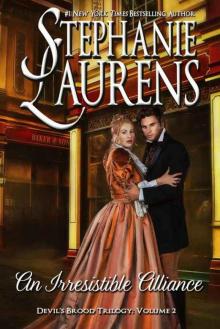 An Irresistible Alliance (Cynsters Next Generation Novels Book 5)
An Irresistible Alliance (Cynsters Next Generation Novels Book 5) The Daredevil Snared
The Daredevil Snared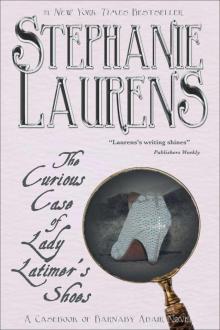 The Curious Case of Lady Latimer's Shoes: A Casebook of Barnaby Adair Novel
The Curious Case of Lady Latimer's Shoes: A Casebook of Barnaby Adair Novel A Lady of Expectations and Other Stories: A Lady of ExpectationsThe Secrets of a CourtesanHow to Woo a Spinster
A Lady of Expectations and Other Stories: A Lady of ExpectationsThe Secrets of a CourtesanHow to Woo a Spinster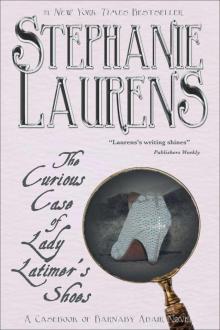 The Curious Case of Lady Latimer's Shoes: A Casebook of Barnaby Adair Novel (The Casebook of Barnaby Adair)
The Curious Case of Lady Latimer's Shoes: A Casebook of Barnaby Adair Novel (The Casebook of Barnaby Adair) The Truth About Love
The Truth About Love A Rogue's Proposal
A Rogue's Proposal The Elusive Bride
The Elusive Bride The Perfect Lover
The Perfect Lover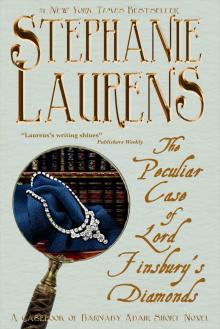 The Peculiar Case of Lord Finsbury's Diamonds: A Casebook of Barnaby Adair Short Novel
The Peculiar Case of Lord Finsbury's Diamonds: A Casebook of Barnaby Adair Short Novel The Lady Risks All
The Lady Risks All The Murder at Mandeville Hall: The Casebook of Barnaby Adair: Volume 7
The Murder at Mandeville Hall: The Casebook of Barnaby Adair: Volume 7 All About Passion
All About Passion A Match for Marcus Cynster
A Match for Marcus Cynster By Winter's Light: A Cynster Novel (Cynster Special Book 2)
By Winter's Light: A Cynster Novel (Cynster Special Book 2) The Lady By His Side
The Lady By His Side The Pursuits of Lord Kit Cavanaugh
The Pursuits of Lord Kit Cavanaugh Tangled Reins
Tangled Reins To Distraction
To Distraction A Rake's Vow
A Rake's Vow A Comfortable Wife
A Comfortable Wife A Lady of His Own bc-3
A Lady of His Own bc-3 The Capture of the Earl of Glencrae
The Capture of the Earl of Glencrae Scandals Bride c-3
Scandals Bride c-3 Untamed Bride
Untamed Bride The Brazen Bride
The Brazen Bride The Lady By His Side (Cynsters Next Generation Novels Book 4)
The Lady By His Side (Cynsters Next Generation Novels Book 4) Tangled Reins and Other Stories
Tangled Reins and Other Stories Impetuous Innocent
Impetuous Innocent The Confounding Case Of The Carisbrook Emeralds
The Confounding Case Of The Carisbrook Emeralds Stephanie Laurens - B 6 Beyond Seduction
Stephanie Laurens - B 6 Beyond Seduction What Price Love?
What Price Love? A Fine Passion
A Fine Passion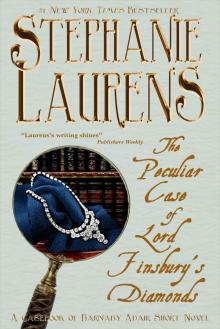 The Peculiar Case of Lord Finsbury's Diamonds: A Casebook of Barnaby Adair Short Novel (The Casebook of Barnaby Adair)
The Peculiar Case of Lord Finsbury's Diamonds: A Casebook of Barnaby Adair Short Novel (The Casebook of Barnaby Adair) Where the Heart Leads
Where the Heart Leads The Designs of Lord Randolph Cavanaugh
The Designs of Lord Randolph Cavanaugh A Secret Love c-5
A Secret Love c-5 On a Wicked Dawn c-10
On a Wicked Dawn c-10 A Gentleman's Honor
A Gentleman's Honor THE LEGEND OF NIMWAY HALL_1750_JACQUELINE
THE LEGEND OF NIMWAY HALL_1750_JACQUELINE A Lady of Expectations
A Lady of Expectations Royal Weddings: An Original Anthology
Royal Weddings: An Original Anthology The Ideal Bride (Cynster Novels)
The Ideal Bride (Cynster Novels) Mastered by Love
Mastered by Love A Buccaneer at Heart
A Buccaneer at Heart Captain Jack’s Woman / A Gentleman's Honor
Captain Jack’s Woman / A Gentleman's Honor Devil's Bride with Bonus Material
Devil's Bride with Bonus Material A Lady of His Own
A Lady of His Own A Secret Love
A Secret Love Melting Ice
Melting Ice Scandal's Bride
Scandal's Bride Lady Osbaldestone’s Christmas Goose
Lady Osbaldestone’s Christmas Goose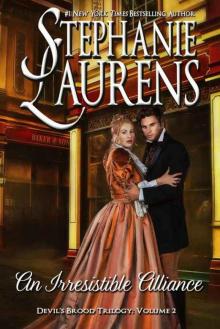 An Irresistible Alliance
An Irresistible Alliance It Happened One Season
It Happened One Season In Pursuit Of Eliza Cynster
In Pursuit Of Eliza Cynster Captain Jack's Woman
Captain Jack's Woman The promise in a kiss c-8
The promise in a kiss c-8 The Masterful Mr. Montague
The Masterful Mr. Montague The Lady Chosen
The Lady Chosen A Gentleman's Honor bc-2
A Gentleman's Honor bc-2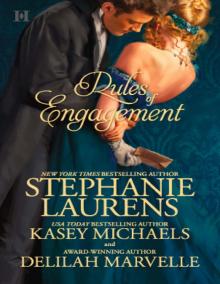 Rules of Engagement: The Reasons for MarriageThe Wedding PartyUnlaced (Lester Family)
Rules of Engagement: The Reasons for MarriageThe Wedding PartyUnlaced (Lester Family) Secrets of a Perfect Night
Secrets of a Perfect Night The Taste of Innocence
The Taste of Innocence On A Wicked Dawn
On A Wicked Dawn The Untamed Bride
The Untamed Bride A Rogues Proposal c-4
A Rogues Proposal c-4 Rakes Vow c-2
Rakes Vow c-2 Devils Bride c-1
Devils Bride c-1 Hero, Come Back
Hero, Come Back On a Wild Night c-8
On a Wild Night c-8 All About Passion c-7
All About Passion c-7